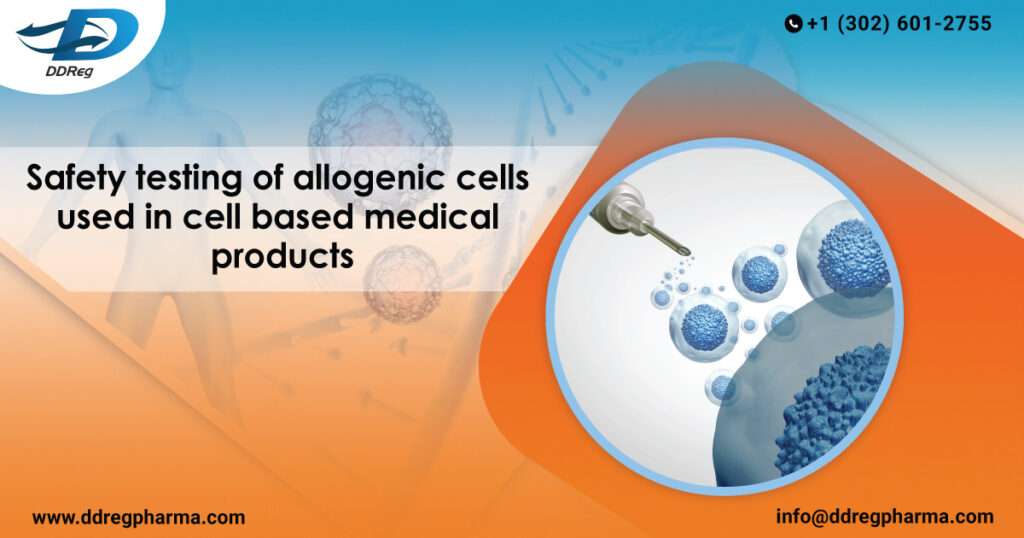Cell based medicinal products use a single source of cells to treat multiple patients. For example, allogeneic cell therapies use donor cells to create a Master Cell Bank (MCB) that are then processed to be used in different kinds of therapies. The use of allogeneic cells to develop medicinal products and therapies demands rigorous testing to ensure their safety and sterility. Therefore, manufacturers of allogenic cell-based medical products require recommendations to help identify appropriate safety testing of cells. More recently, in April 2024, the FDA released a draft guidance, “Safety Testing of Human Allogenic Cells Expanded for Use in Cell-Based Medical Products” . Not only does the guidance provide recommendations on cell safety testing but it also helps sponsors ensure that they include the appropriate information in the Investigational New Drug application (IND) or Biologics License application (BLA).
Key considerations for Cell Safety Testing
The draft document assists manufacturers with meeting the requirements for Culture- 21 CFR 610.18(c)(1) and INDs- 21 CFR 312(a)(7).
The nature of the testing that needs to be performed on cells depends on their expansion potential and the number of individuals that need to be treated using the cells. There are, therefore, three main categories in which the cells used in medicinal products can be divided.
Continuous cell lines and primary cells capable of extensive expansion in culture
Cell based medicinal products typically have two-tiered cell banking systems. The Master Cell Bank (MCB) uses donor cells to create an initial cell bank. From there, a working cell bank (WCB) can be taken that is used in the medicinal products or therapies.
Master Cell Bank
- Bacterial and Fungal sterility should be tested in accordance with United States Pharmacopeia (USP)<71> or by using appropriately validated methods (21 CFR 610.12)
- Mycoplasma can be tested by following USP <63>. If alternative assays are being used, they need to have appropriate sensitivity comparable to the pre-existing method.
- Human pathogen testing should be done by polymerase chain reactions (PCRs) and can include testing for pathogens including, but not limited to, Human Immunodeficiency Virus (HIV) 1&2, Human Papilloma Virus (HPV) etc.
- Virus testing can be done on the parent cell line that is being used in the production process. If cells have risk factors that cannot be mitigated by other forms of testing, an in vivo virus testing may be appropriate. These methods include techniques such as high throughput sequencing. Transmission electron microscopy should also be done to detect virus particles.
- If the human cells are being grown on non-human feeder layers, the cells must be tested for the presence of species-specific and endogenous retroviruses.
- Virus testing should be done for animal viruses. To test for bovine derived viruses, 9 CFR 113.47 should be followed and 9 CFR 113.47(b)(1) and (2) if bovine derived reagents are used. To test for porcine derived viruses, 9 CFR 113.53(d) should be followed and 9 CFR 113.47(b)(1) and (6) if porcine derived reagents are used.
- Whole genome sequencing should be done to check for any mutations that may have accumulated on expanding cells significantly. FDA recommends the read depth to be 50X or more, and the sequencing results to be compared to a database of cancer-related mutations.
- Tumorigenicity testing can be done on the cells in the final product if they are similar to the cells in the MCB. For continuous cell lines, genomic stability and growth characteristics should be measured but tumorigenicity is not recommended for cancer cell lines and pluripotent stem cells. Similarly, tumorigenicity testing for irradiated cells is not recommended.
Working Cell Bank (WCB)
If a WCB is being used in the manufacturing, all tests listed above for MCB should be be done for WCB. This would include, but is not limited to, tests to check for sterility, identity, mycoplasma, in vitro adventitious agents.
Primary Cell capable of limited expansion in culture
Cells that cannot be expanded extensively typically do not need to undergo all the testing list for the MCB and WCB. The safety tests that are required need to check for sterility, mycoplasma, human pathogen testing using PCR as listed for the MCB above and in vitro adventitious agents. Whole genome sequencing is recommended for cells that are not extensively expanded and have undergone genome editing, to check for both on and off target editing. Additional tests can be conducted only if needed, on a case-by-case basis.
Cells administered to a limited number of individuals
Cells that that are administered to a few individuals or a single individuals are not subject to the requirements of 21 CFR 610.18(c). However, they still need to undergo testing for sterility (21 CFR 610.12) and purity (21 CFR 610.1). Testing may be performed on reagents if there are concerns regarding their safety and sterility.
Conclusion
Viral and microbial contamination can create risks for cell-based medical products highlighting the need for a risk-based approach in cell safety testing. In order to ensure the safety of cells being used in medicinal products, the FDA put out this draft guidance that helps manufacturers and sponsors of such products. This guide supplements following two guidance documents and should be referred to collectively:
- “Chemistry, Manufacturing, and Control (CMC) Information for Human Gene Therapy 28 Investigational New Drug Applications (INDs); Guidance for Industry,” dated January 29 2020, and
- “Guidance for FDA Reviewers and Sponsors: Content and Review of Chemistry, 31 Manufacturing, and Control (CMC) Information for Human Somatic Cell Therapy 32 Investigational New Drug Applications (INDs),” dated April 2008
Reach out to DDReg for your regulatory and pharmacovigilance needs related to cell and gene therapy products. With over 15 years of in-depth regulatory and safety experience, DDReg is your go-to-partner for regulatory consulting and safety compliance.

